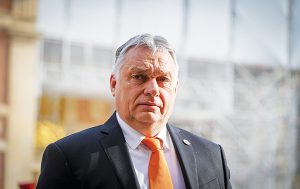Bloomberg
The two European leaders most closely allied to Russian President Vladimir Putin before he launched his invasion of Ukraine won decisive election victories on pledges to stay out of the war.
Hungarian Prime Minister Viktor Orban, who has spent 12 years consolidating his grip on power and clashing with the European Union over democratic values, clinched a fourth consecutive term in a crushing victory over a broad opposition alliance. Putin congratulated Orban on his victory.
In neighbouring Serbia, Aleksandar Vucic won five more years as president and his ruling Serbian Progressive Party was in position to form a majority-backed government. Like Orban, he has drawn criticism from his rivals and countries in the EU, which he wants Serbia to join, for suppressing political opposition. Both had until recently defied warnings from western partners by cultivating ties with Moscow and Beijing.
The results expose one of the thorniest issues facing the EU: How to deal with current members or future aspirants who defy the bloc’s rule-of-law standards and veer from peers on important geopolitical issues such as Ukraine.
At the same time, Orban and Vucic may face deeper international isolation, with Hungary at risk of losing billions of euros in EU funding and Serbia struggling to advance with talks to join the wealthy single market.
“We scored such a huge victory that was visible even from the Moon, but certainly from Brussels,†Orban told supporters after the vote, referring to the seat of the EU in the Belgian capital.
Orban’s party maintained its two-thirds majority in the 199-seat parliament, according to results with more than 99% of ballots counted.
A majority of that size will allow it to change any law, including the constitution, without opposition support.
The war in Hungary’s eastern neighbour, which has killed thousands of civilians and driven more than 4 million to flee abroad, upended the election campaign, forcing 58-year-old Orban to walk a political tightrope.
He tried to distance himself from Putin by condemning Russia’s actions and backing EU sanctions against his regime, while opening Hungary’s borders to about half a million Ukrainian refugees. Still, Orban limited support for Kyiv, refusing to let weapons shipments cross Hungary and rejecting a ban of Russian oil and gas imports, drawing condemnation from Ukrainian President Volodymyr Zelenskiy.
“He is virtually the only one in Europe to openly support Mr. Putin,†Zelenskiy said a day before Hungary’s vote, referring to Orban.
 The Gulf Time Newspaper One of the finest business newspapers in the UAE brought to you by our professional writers and editors.
The Gulf Time Newspaper One of the finest business newspapers in the UAE brought to you by our professional writers and editors.
